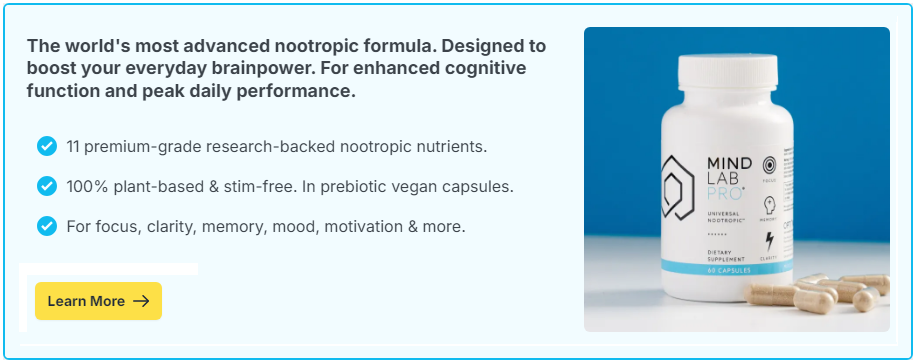
Medical school is one of the most intellectually demanding academic paths, requiring students to absorb massive amounts of information, recall complex medical concepts, and perform under extreme pressure. Long study sessions, clinical rotations, and high-stakes exams push students to their cognitive limits, often leading to mental fatigue, burnout, and difficulty retaining critical information.
With such high demands, many medical students seek ways to optimize their cognitive function. While traditional study techniques, time management strategies, and lifestyle habits play a crucial role, cognitive enhancers—also known as nootropics—offer an additional tool to improve memory, concentration, and mental stamina.
Contents
The Cognitive Demands of Medical School
Medical students must master an extensive range of topics, from anatomy and biochemistry to pathology and pharmacology. The sheer volume of material and the high-pressure environment create several cognitive challenges:
Information Overload
Medical students are required to process and retain vast amounts of data. The ability to recall details accurately during exams and clinical practice is essential for success.
Long Study Hours and Mental Fatigue
Medical students often study for 8–12 hours per day, leading to mental exhaustion. Sustaining focus and preventing burnout are critical for long-term academic success.
High-Stakes Testing
Exams like the USMLE, MCAT, and board certifications require not only deep knowledge but also excellent recall and problem-solving skills under timed conditions.
Clinical Rotations and Decision-Making
During rotations, students must apply theoretical knowledge to real-world scenarios, making quick and accurate decisions under pressure.
Managing Stress and Anxiety
Medical school is highly competitive, and students often experience stress and anxiety, which can impair cognitive performance and memory retention.
How Nootropics Enhance Learning and Retention
Nootropics optimize brain function by improving neurotransmitter activity, increasing neuroplasticity, and reducing mental fatigue. Here’s how they help medical students:
Boosting Memory and Recall
Nootropics that enhance acetylcholine and glutamate activity improve memory formation and recall, making it easier to retain medical concepts.
Enhancing Focus and Attention
Dopaminergic nootropics improve sustained attention, helping students concentrate for long study sessions without mental fatigue.
Increasing Mental Stamina
By optimizing mitochondrial function, certain nootropics help sustain energy levels and prevent burnout during extended study periods.
Reducing Stress and Anxiety
Adaptogenic nootropics regulate cortisol levels, promoting a calm, focused mindset, which is crucial for learning under pressure.
Improving Problem-Solving Skills
Some nootropics enhance cognitive flexibility and executive function, helping students analyze complex medical cases and make informed decisions.
Best Nootropics for Medical Students
Not all nootropics are equally effective. Below are the most powerful cognitive enhancers for learning, memory retention, and focus:
Citicoline
Citicoline boosts acetylcholine production, improving memory retention, attention, and cognitive processing speed—ideal for mastering medical terminology and concepts.
Bacopa Monnieri
A well-known memory booster, Bacopa Monnieri enhances synaptic communication and reduces stress, making it easier to retain and recall information.
L-Theanine + Caffeine
This combination enhances alertness and mental clarity without the jittery side effects of caffeine alone, making it perfect for long study sessions.
Modafinil
Modafinil promotes wakefulness and sustained focus, helping students stay sharp and productive during long days of studying.
Lion’s Mane Mushroom
Stimulates nerve growth factor (NGF), improving long-term cognitive health, memory formation, and learning ability.
Rhodiola Rosea
An adaptogen that combats mental fatigue and stress, allowing students to stay mentally resilient under pressure.
Noopept
Noopept enhances neuroplasticity, improving learning speed and memory consolidation—ideal for absorbing large amounts of medical knowledge.
L-Tyrosine
Boosts dopamine levels, enhancing motivation, mental endurance, and stress resilience during high-pressure study periods.
Ashwagandha
Reduces cortisol and stress-related anxiety, helping students maintain focus and emotional balance during exams.
Phenylpiracetam
Enhances problem-solving skills, reaction time, and cognitive flexibility, making it a valuable tool for clinical decision-making.
How to Integrate Nootropics into a Medical Student’s Routine
To maximize the benefits of nootropics, medical students should follow a structured approach:
Identify Specific Cognitive Needs
Determine whether you need improved memory, better focus, or stress reduction. Choose nootropics that align with your goals.
Start with One Nootropic
Introduce one nootropic at a time to evaluate its effectiveness before stacking multiple supplements.
Time Nootropic Usage Strategically
- Take memory-enhancing nootropics like Bacopa Monnieri and Citicoline in the morning.
- Use Modafinil or L-Theanine + Caffeine before long study sessions.
- Take adaptogens like Rhodiola Rosea in the afternoon to manage stress.
Combine with Effective Study Techniques
- Use active recall and spaced repetition for long-term memory retention.
- Implement Pomodoro sessions to maintain deep focus and prevent burnout.
- Engage in peer teaching to reinforce learning.
Support Brain Health with Lifestyle Choices
- Prioritize sleep (7–9 hours) for memory consolidation.
- Follow a brain-healthy diet rich in omega-3s, antioxidants, and lean proteins.
- Exercise regularly to enhance cognitive function and blood flow.
Medical students face immense cognitive challenges, requiring exceptional memory, focus, and resilience. Nootropics provide a powerful tool to enhance learning, improve retention, and maintain mental stamina throughout medical school.
By strategically incorporating cognitive enhancers, optimizing study techniques, and maintaining a healthy lifestyle, medical students can unlock their full potential and excel in one of the most demanding fields of study.

